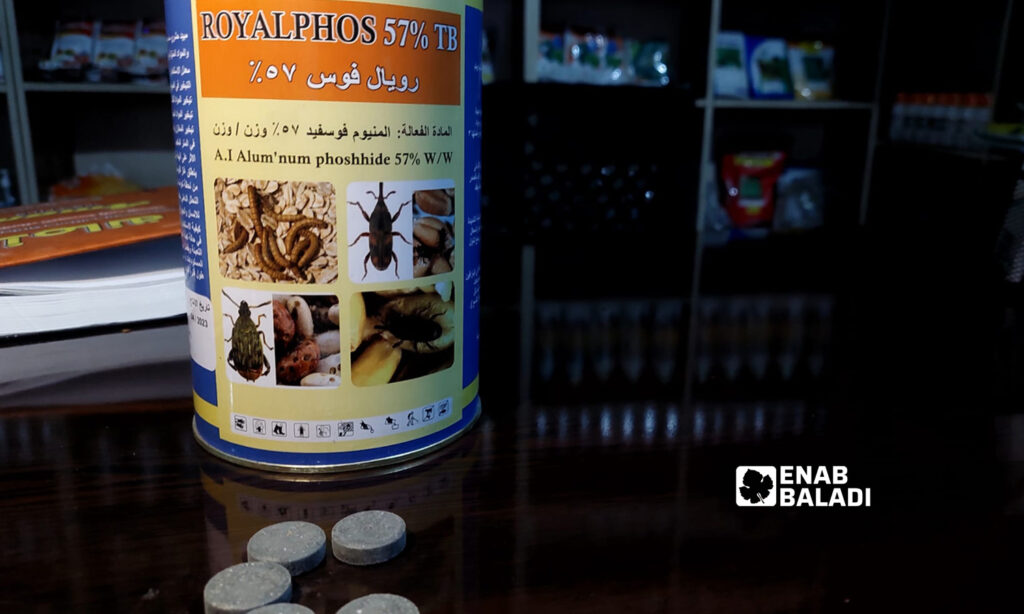Cases of suicide by ingesting the toxic aluminium phosphide tablets have been recurring in the areas of northwest Syria, prompting a search for a mechanism to regulate its sale in the region and the specific conditions for that, its hazards, and its chemical composition.
The phosphide tablets or as some people in the region colloquially call it, the “grain pill,” are common names for aluminum phosphide tablets.
The pill is used as an insecticide and rodenticide, and merchants in northwest Syria use it in grain warehouses to protect them from insects. Some families use it for similar reasons, fearing spoilage and damage to their food supplies.
According to what Enab Baladi observed, the phosphide tablets are sold in agricultural pharmacies, with a slight presence in grocery stores, which contradicts the circulars published by the Syrian Salvation Government (SSG) regarding the handling and purchase of the substance.
Sold with conditions
The Ministry of Agriculture and Irrigation in the Salvation Government operating in Idlib province, the northern Hama countryside and part of the western countryside of Aleppo, issued circular No. “3”, on February 5 of the current year, about the executive instructions for dealing with the phosphide tablets substance.
The circular, directed to all owners of agricultural pharmacies and depots, prohibited the sale of aluminum phosphide (the grain pill) to anyone except farmers.
According to the statement, its sale to farmers is limited after obtaining an official document signed and stamped by the agricultural departments to allow the farmer to use the substance for sterilization and control purposes under the supervision of the relevant agricultural departments.
The circular noted that non-compliance is subject to legal and Sharia accountability.
Six children in a month
The Deputy Director of Health in Idlib, Dr. Hossam Qarah Muhammad, told Enab Baladi that the total number of suicide attempts in northwest Syria reached 12 attempts, six of which were successful, during the past month of January.
Dr. Muhammad continued, saying that all six cases involved children who used aluminum phosphide tablets.
The suicide attempts were distributed among five children in the city of Idlib and one child in the city of Azaz in the northern countryside of Aleppo, and this was documented by the group concerned with suicide.
In terms of awareness sessions on the dangers of dealing with the “grain pill,” the Idlib Health Directorate coordinates these sessions with the technical group concerned with mental health, according to the doctor.
A 100% chance of dying
The aluminum phosphide tablets, which is a gaseous insecticide, consists of aluminum phosphide, ammonium carbamate, in addition to paraffin as a carrier substance, and is used for fumigating wheat, barley, and millet grains, warehouses, and many other purposes.
Phosphine gas, which is toxic, is released when the tablet comes into contact with water or humidity in the open air and the chemical reaction begins two to four hours later.
According to what the Idlib Health Directorate published, the death chance from the “grain pill” is 100%, except in cases where the patient is immediately rescued and the special treatment protocol for such situations is applied.
Symptoms of poisoning by the phosphide tablets include nausea, vomiting, loss of consciousness, in addition to a severe drop in blood pressure, according to the directorate.
Warnings
The packages are recorded with several warnings and grain storage conditions in addition to explaining the method of their use and what purposes they are available for, guiding sellers in agricultural pharmacies and the people who use and purchase them, within the new conditions set by the Salvation Government through its circular.
Among the warnings and conditions for storing grains is to avoid the dissolved pill from contacting skin and eyes, and if clothes and skin are contaminated, it is necessary to wash them with soap and water and to not drink or eat the tablet while using it as an insecticide.
Attention should be paid to keeping the pills away from children and populated areas, and to dispose of the empty capsules after using them for their intended purposes and burying them in places far from humans.
The warnings indicated that the original packages should be stored in tightly sealed warehouses that are dry from moisture, well-ventilated, and that water does not seep into them and kept away from sunlight and any chemical substances.
Aluminum phosphide tablets inside an agricultural pharmacy in Azaz in the countryside of Aleppo – February 8, 2024 (Enab Baladi/Dayan Junpaz)
Uses
Some owners of agricultural pharmacies in northwest Syria rely on selling phosphide tablets in a powdered (fine) form, and not as large solid pills, to prevent their purchase for the purpose of suicide, which has spread in recent years.
Agricultural engineer Abdullah Ahmed Taleb told Enab Baladi that he does not sell the large phosphide tablets; rather, he resorts to the powdered form and sells them to farmers who he makes sure use them correctly, including those who buy them in the spring for mice burrowing or for those who want them for sterilizing the broad bean crop.
The engineer emphasized that it is impossible to sell the tablets to a young minor child, regardless of the reason for the request, or to the residents who ask for them for storing home supplies.
He pointed out that the government has no relation to distributing the phosphide tablets; rather, the delegates, distributors, and merchants are the ones who provide them to agricultural pharmacies.
Agricultural engineer Ahmad Abbas told Enab Baladi that he sells the “grain pill” to residents who request it for preserving home supplies and to farmers, and the price of one is 2.5 Turkish lira (less than 10 US cents).
The agricultural engineer indicated that it is necessary to be careful to place the tablet within a piece of cloth or paper towels when using it to prevent the smell of gas from coming out and harming the people present in the place.

